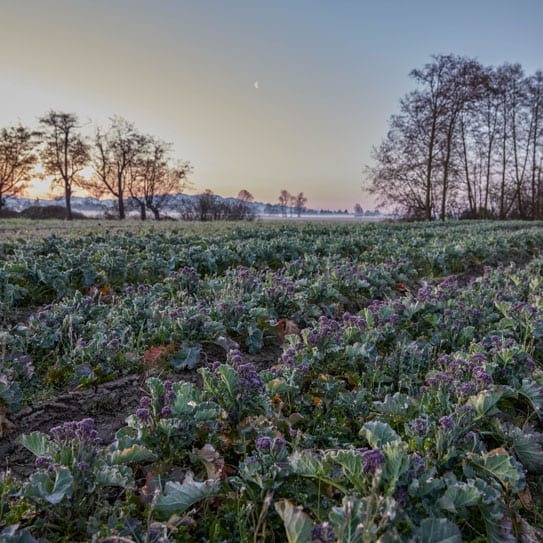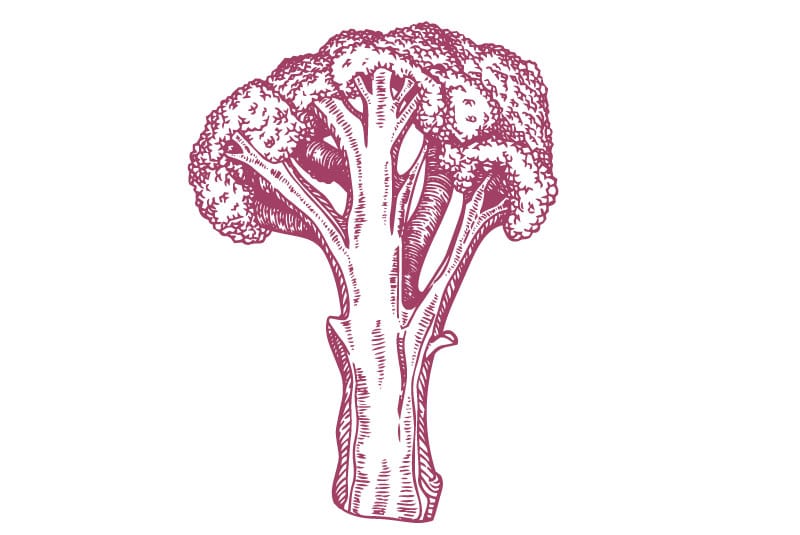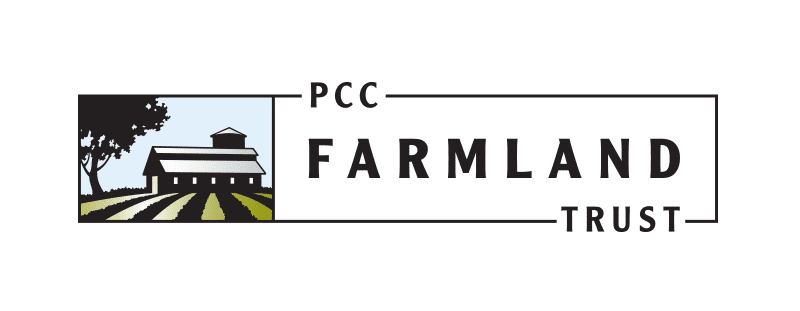
“This annual Co-op Purposes Report is another example of how we strive to continue to earn our members’ and shoppers’ trust.”
– Cate Hardy, CEO
Read letters from board and ceo

“This annual Co-op Purposes Report is another example of how we strive to continue to earn our members’ and shoppers’ trust.”
– Cate Hardy, CEO
Read letters from board and ceo
For anyone who strives to eat seasonally in the Northwest, March can pose a particular challenge. After maintaining a steady diet of kale and potatoes, locals run out of new ways to cook winter squash, and they’ve long since emptied their freezers of summer fruit. There’s still a good month and a half before Washington asparagus makes its grand entrance. It’s in this void that sweet purple sprouting broccoli swoops in to revitalize tired taste buds.
“The Pacific Northwest is a leader in local, nutritious and organic food trends,” said Micaela Colley, Program Director with Organic Seed Alliance (OSA). “Purple sprouting broccoli falls into all these categories.”
In 2009, OSA began developing trial varieties of purple sprouting broccoli — an English heirloom broccoli — for the Northwest. Joined by Nash Huber of Nash’s Organic Produce — OSA’s neighbor on Washington’s Olympic Peninsula — and Tom Lively of Organically Grown Company (OGC) based in Eugene, Oregon, the project quickly gained momentum.
“OGC became involved in a desire to support Northwest winter production,” said Micaela.
Purple sprouting broccoli is planted in the fall. With florets resembling bouquets of French lavender, it’s ready for harvest before the first day of spring, providing a critical financial boost right when small farmers need it most.
“Our winters are cold enough to induce bud development, but not so cold that the crop freezes,” said Micaela.
Despite the Northwest’s temperate climate, a lot of work has been required to optimize this new organic vegetable for the region — work that continues today.
“The truth is, our winter lows can fluctuate,” said Micaela, “and not all varieties are equally cold tolerant.”
OSA works closely with local farms to track temperatures, test planting dates and ultimately breed new varieties that can grow reliably in Washington and Oregon. OGC supports growers in a myriad of ways, from hands-on training and crop monitoring to purchasing and distributing plant starts to setting guaranteed prices per case.
Encouraged by their longtime partnership with OGC and commitment to local growers, PCC petitioned the Washington State Department of Agriculture to select the purple sprouting broccoli project for funding. In addition, PCC pledged ongoing production support and marketing through both digital channels and in-store promotions.
“I’ve got to hand it to them,” said Joe Hardiman, veteran PCC Produce Merchandiser. “This project took a really long time. It’s amazing what they’ve done with it.”
Purple broccoli is one of many ways in which Organically Grown Company has bolstered local, organic food economies up and down the West Coast — work they’ve been committed to for more than 40 years.
Founded in 1978, OGC began as a community of gardeners, farmers and environmental advocates committed to making organic food more accessible. They exchanged knowledge and pooled their resources to buy supplies.
“When the founders realized that the best way to promote organic agriculture would be to help farmers sell their produce,” said Tonya Sanchez, OGC’s Marketing Communications Manager, “we became a grower-owned, agricultural marketing co-op.”
This means small farmers could combine their product in order to reach minimums required by restaurants and retailers. More product from small, local farms in the market means better access to high-quality, organic food for regional communities.
In 1993, OGC became an S Corporation in order to include employees in company ownership. Then, in July 2018, they embarked on a brand new business model by creating the Sustainable Food & Ag Perpetual Purpose Trust.
“The Trust will eventually hold 100 percent of ownership rights, ensuring that the company will never be swallowed up by outside investors or sold to a large competitor that might water down the mission,” said Tonya. “It allows the company to stay financially resilient and grow its impact through a community investment vehicle […], similar to many co-ops.”
Instead of focusing on shareholder interests and maximizing profits, OGC can now concentrate on maximizing their purpose — expanding organic agriculture in the U.S.
“OGC’s mission — to cultivate a diverse, sustainable and engaged organic trade from farm to marketplace — dovetails seamlessly with the work PCC does,” said Tonya. “Together, we focus holistically on supporting the organic marketplace.”
“OGC and PCC are like-minded companies,” said Kevin Byers, PCC Produce Merchandiser. “Our values are aligned and our stories are very similar.”
When it comes down to it, this partnership thrives because it’s driven by people, not profit.
Since 1998, PCC has worked with OGC to tackle organic agriculture projects, from establishing higher product standards to broadening and diversifying organic grocery inventory. Many small farms struggle to compete with large-production companies. OGC steps in by creating new markets for differentiated varieties of produce — new avenues for farmers who can’t churn out massive shipments of base commodities, like navel oranges and Gala apples.
This in turn enables PCC to supply their members and shoppers with nutritious, organic, and inspiring produce for more of the year. Enter: purple sprouting broccoli.
In its first year on shelves, PCC sold less than 50 pounds of the new variety. The following year, that number jumped by 96 percent.
“Some of our customers still have a hard time understanding that we can have local produce in February and March,” said Joe. “Now, a lot of those skeptical customers are marking their calendars every year for purple broccoli. And there’s a big customer base still yet to be found.”
Rich in antioxidants, purple sprouting broccoli has a sweet, nutty flavor similar to baby broccolini. It’s excellent served raw in a spring salad or try gentler methods of cooking, like baking or pan-frying, as its purple color fades to green with heat.
“Investing in local farmers and their purple sprouting broccoli crops is just one step in helping to develop a robust local food economy,” said Tonya.
Today, OGC continues to work with a growing number of Northwest farms to bring more purple sprouting broccoli to the region. In turn, more growers are able to keep their crews employed for a larger portion of the year.
“PCC is committed to supporting organic, local agriculture,” said Kevin, “and our partnership with Organically Grown Company allows us to fulfill that commitment.”

Founded by PCC but operated as a separate 501(c)(3), PCC Farmland Trust’s nonprofit mission is to secure, preserve and steward threatened farmland in Washington state, ensuring that generations of local farmers use sustainable and organic growing methods. We donated more than $254,000 to support PCC Farmland Trust in 2018. Shoppers and vendors funded over $53,000 of that donation — the rest was in-kind or financial support from PCC.

With a mission to provide real solutions to poverty, homelessness and hunger, FareStart has been transforming lives through food in Seattle for more than 25 years. In 2018, we gave approximately $15,000 in in-kind and financial support to FareStart. In addition to sponsoring the FareStart Gala, we participated in a FareStart Guest Chef Night dinner and provided a culinary class for the students of FareStart’s Youth Culinary and Customer Service Training Program. Finally, when individuals graduate from FareStart’s job training program, our HR team helps them update their resumes and practice interviewing skills. PCC hires FareStart graduates to work in our stores, as well.

A local, nonprofit organization, Ventures helps entrepreneurs with limited resources gain access to capital, coaching and hands-on learning opportunities. PCC partnered with them in 2018, providing $15,000 in financial support. We also opened our shelves to three Ventures entrepreneurs during the holiday season. Our merchandisers mentored these individuals, helping them scale up and ready their products for our stores. As a result, these businesses realized more than $11,000 in product sales in our stores over the holidays, and some have earned a permanent place on our shelves.
In 2018, the PCC Community Grant program awarded $4,000 each to eight local nonprofits with missions focused on social action and environmental stewardship.
Farms for Life
Acts as a bridge for local farmers to distribute fresh produce to populations that don’t have regular access to healthy food.
Coyote Central
Encourages Seattle-area adolescents of all racial, economic and social backgrounds to be creative thinkers who are confident and engaged with their community.
Washington Kids in Transition
Provides food and nutrition access for homeless youth in the Edmonds School District.
Street Bean Coffee Roasters
Supports at-risk youth with tangible training in the service industry.
Stewardship Partners
Creates people-based solutions that engage Puget Sound communities as caretakers of the land and water that sustain us.
Duwamish River Cleanup Coalition
Works to ensure a cleanup of the Duwamish River that is accepted by and benefits the community, and protects fish, wildlife and human health.
Got Green
Advocates for environmental justice and environmental equity using a grassroots approach.
Puget Soundkeeper Alliance
Engages volunteers and advocates for protection and cleaning of the Puget Sound waterways.
In collaboration with Organically Grown Co., we donated $60,000 in proceeds from the sale of organic apples in 2018 through our Farm to School bagged apples. These funds were donated to Oxbow Farm & Conservation Center, Green Plate Special and Washington Green Schools.
We donated over $26,000 from sales of 45,872 cases of bananas in 2018 to support banana farm worker health and well-being through the GROW (Giving Resources and Opportunities to Workers) Fund.
PCC partners with Chinook Winery to offer specially labeled bottles of wine to support Chinook salmon habitat. For every bottle sold, we donate $2 to Long Live the Kings, which amounted to $6,104 in 2018.